Each year, the AAG invites nominations for AAG Honors to be conferred in recognition of outstanding contributions to the advancement or welfare of the profession. The AAG Honors Committee is charged with making award recommendations for each category, with no more than two awards given in any one category. This year, the AAG Honors Committee and the AAG Council are pleased to announce the following AAG Honorees.
AAG Lifetime Achievement Honors
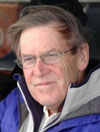 William Clark
William Clark
Clark is considered as “one of the intellectual giants” in geography and beyond. A population and urban geographer, Clark’s longer than half-century distinguished career has produced 10 books and about 250 journal articles or book chapters (including more than 30 post-retirement).
Clark has made groundbreaking theoretical and methodological contributions to population and urban scholarship within and beyond geography. His 1991 article in Demography, applying a 1971 Schilling Model of choice to study urban residential location and persistent racial and ethnic residential separation, is considered as path breaking. Using longitudinal or panel data, he also examines the dynamics of housing choice over the life course and their spatial and non-spatial outcomes. His work analyzes such segregation/separation across multiple residential scales, and also indicates the tradition black versus white paradigm is no longer sufficient to address the contemporary diversity in society.
Having working and living in Southern California, often considered as a harbinger for immigration in recent decades, Clark witnesses the changing demography and neighborhoods in the metropolitan area, while experiencing the immigrant life himself as an immigrant from New Zealand. His 1998 book, The California Cauldron: Immigration and the Fortunes of Local Communities, documents such rapid changes, the impacts of immigration and the economic and social consequences. The 2003 book, Immigrants and the American Dream: Remaking the Middle Class, expands such analysis to a broader scale and illustrates how immigrants transformed themselves as they interacted with and integrated into the American mainstream. Both influential books have generated academic interests and wide media coverage.
Moreover, having served as an analyst and expert witness in some desegregation and redistricting court cases in various metropolitan areas, Clark’s academic work has had broader impacts in the public domain, and demonstrated the roles of geographical research beyond academia.
As an educator and served two-term as the Chair of geography department, Clark is a caring mentor for junior colleagues and graduate students within and beyond UCLA, directly or indirectly influencing generations of population and urban geographers across national boundaries, some of whom become his collaborators.
Clark’s influential work has earned him some of the most prestigious academic awards in the U.S. and internationally. Among the accolades, he is one of the handful geographers nationwide elected as a member in the National Academy of Sciences, an elected Fellow of the American Academy of Arts and Sciences, an Honorary Fellow of the Royal Society of New Zealand, an awardee of Guggenheim Fellowship, along with several honorary doctoral degrees.
One of the nominators summarized in his letter that “Bill’s extraordinary scholarly productivity, still ongoing, his recognitions and awards, his research impact in key areas such as segregation and housing, his policy and legal work, and his generous mentoring” are the best indicators for the lifetime achievements of professor William Clark, and he is recognized by another as “a professional role model par excellence.”
In sum, Clark has had profound and long-lasting impacts in geography and social science in general. His scholarly work, public service, academic leadership and mentorship have fostered critical thinking and vigrous empirical endeavor, to advance geography, and to educate policy-makers and general public alike. For these reasons, Clark is granted AAG Lifetime Achievement Honors.
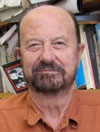 Richard Peet
Richard Peet
Richard Peet’s career as Professor in the School of Geography at Clark University spans more than five decades (and counting). During that time, he has made profound and enduring contributions to numerous fields, with an aggregate impact that has shaped the entire discipline of Geography.
Peet received a BSc in Economics from the London School of Economics in 1961, an MA from the University of British Columbia in 1963, and a PhD in Geography from the University of California-Berkeley in 1967, when he began his career at Clark. Since 2011, he has held the Leo L. ’36 and Joan Kraft Laskoff Endowed Chair in Economics, Technology and Environment. He has held visiting appointments at universities across the US and also in Canada, Australia, Sweden, England, South Africa and New Zealand.
In nearly a dozen books and some 135 articles, Peet has made substantial contributions to a series of subfields. His work in the history of geographical thought has included a striking analysis of environmental determinism published in the Annals in 1985, an exhaustive study of the work of Karl Wittfogel, and above all his book Modern Geographical Thought, which is widely used as the core text for upper-level and graduate training in the discipline.
Peet’s earliest work was in economic geography, including an innovative study of agricultural zonation at a global scale in the nineteenth century. From there he moved into the political economy of development, branching out into globalization and neo-liberalism. His book with Elaine Hartwick, Theories of Development, has been highly influential, while his The Unholy Trinity—a joint effort with students in a seminar he taught in 2001—skewers the World Bank, International Monetary Fund and World Trade Organization for systematically favoring rich nations over poor ones in international economic regulation. Two co-edited volumes, Liberation Ecologies (with Michael Watts) and Global Political Ecology (with Watts and Paul Robbins) have been seminal in political ecology, both by assembling the work of up-and-coming young scholars (nearly all of them now household names in the field) and by fostering constructive engagements between schools of thought that otherwise often remained separate. Throughout all of these endeavors, Peet has displayed a rigorous attention to detail, a comprehensive mastery of his subjects, and a dedication to the candid exchange of arguments and ideas.
These values have been most powerfully realized in Peet’s role as a co-founder and editor of journals dedicated to radical geography. Under his leadership from 1969 to 1985, Antipode helped nourish a vast and diverse body of scholarship that would not have found expression elsewhere but has since grown into one of the most innovative and cutting-edge frontiers of geography. The journal—and the foundation-collective underlying it—gave voice to burning debates about civil rights and women’s liberation, poverty and inequality, colonial struggles and wars of independence. Peet’s keen eye and steady guidance brought Antipode to lasting prominence while inspiring and nurturing a generation of radical geographers from around the world. It eventually grew so successful that Peet decided to found another journal, Human Geography, to continue the project anew.
The AAG is proud to recognize Professor Richard Peet with a Lifetime Achievement Award for his extraordinary career as a scholar, teacher, mentor, editor and activist.
AAG Distinguished Scholarship Honors
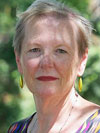 Katherine Gibson
Katherine Gibson
The Association of American Geographers is proud to present Dr. Katherine Gibson with Distinguished Scholarship Honors in recognition of her tremendous contributions to economic geography. Dr. Gibson, along with the late Dr. Julie Graham, has sought no less than to challenge traditional understandings of Marxian geography. By drawing on feminist and poststructuralist theory and practice, they have provided an alternative interpretation of both the nature of existing capitalist economic activity, and perhaps more importantly, provided a different conception of “what is to be done.”
Drs. Gibson and Graham, writing together as J.K. Gibson-Graham, have published two major books. The first, The End of Capitalism (As We Knew It): A Feminist Critique of Political Economy (Blackwell, 1996, re-issued by Minnesota, 2006) and A Postcapitalist Politics (Minnesota, 2006). The first book, The End of Capitalism, which has been translated into Spanish, Chinese, Korean, Turkish, and Portuguese, explored through a series of cogent essays the many forms non-capitalist economic activities can take. They offered simultaneously a new approach to Marxism—a recognition that there is a space outside capitalism and that non-capitalist actions can penetrate it—as well as a practical call to action. Whereas mainstream Marxism calls for revolution as the only challenge to capitalism, J.K. Gibson-Graham’s work demonstrated that this is not the case. Rather, non-capitalist forms of economy are already all around us, waiting to be recognized and cultivated. In many ways, The End of Capitalism offers the strongest critique of mainstream Marxism to date. The second major book, A Postcapitalist Politics, took this work further by refining the argument and offering many more examples and case studies. This book incorporates the results of fieldwork carried out by Dr. Gibson in such places as Australia, Papua New Guinea, Indonesia, the United States, and Spain. The result of this work is nothing less than a new branch of Marxism and a new path forward for progressive politics.
While Dr. Gibson has continued this line of work, as seen in the edited volume, Take Back the Economy, and as Director of the international research network, Community Economies, she has also pursued related but distinct research trajectories. For instance, she has an edited volume entitled, A Manifesto for Living in the Anthropocene, and has explored film as a form of popular education. All told, Dr. Gibson is the co-author or co-editor of eleven books. She was elected as a Fellow of the Australian Academy of Social Sciences.
In recognition of her extraordinary scholarship aimed at creating a better future by emphasizing the human potential to restructure and to rethink what economies are, the AAG offers Dr. Gibson this honor.
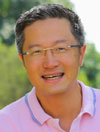 Henry Yeung
Henry Yeung
The Association of American Geographers is proud to present Professor Henry Wai-chung Yeung, Provost’s Chair Professor in Geography at the National University of Singapore, with Distinguished Scholarship Honors in recognition of his pioneering scholarly contributions and leadership in economic geography.
Rooted in a network-oriented approach from a Southeast Asian perspective, Dr. Yeung’s scholarship has made major conceptual advances in relational economic geography and empirical contributions to the study of globalization. Professor Yeung’s major body of scholarly work offers fundamental insights into the geographic nature of the production process and the changing nature of the relationship between states and firms. This focus has led him to pioneer investigations into relational economic geography and global production networks, an approach that seeks to unravel how economic globalization actually connects with, and has differential impacts on, specific places—be they cities, regions, or countries.
Dr. Yeung’s exemplary scholarship is recognized globally. He is appointed as Overseas Experts to the Chinese Academy of Sciences, and in 2012 received an Individual Residency Fellowship at the Rockefeller Foundation’s Bellagio Study and Conference Center. In 2016, he was awarded the Royal Geographical Society’s 2017 Murchison Award for his pioneering scholarship on globalization. These honors reflect the significance of his work. Indeed, Professor Yeung’s work has been described as “the most significant new contribution to geographic development theory in a decade.” As Professor Murphy writes: “He is one of the leading researchers in economic geography today, and he has given much to the disciplinary and institutional communities of which he is a part.” Others have described Professor Yeung’s scholarship as holding significance beyond economic geography, “extending to all areas of human geography that touch upon the powerful world of the economy and its relationship to place, and offers crucial insights into understanding the processes that shape our contemporary global economy.”
Professor Yeung has done much to promote the research of others in economic geography and allied subfields. He served as editor of major geographic journals: Economic Geography and Environment and Planning A. Moreover, he has played a leadership role at the National University of Singapore in the service of strengthening that institution’s research mission, and he has been active in both the American Association of Geographers and the Regional Studies Association—organizing sessions and promoting the work of fellow scholars.
Thus, in recognition of his extraordinary scholarship and leadership in the discipline, the AAG offers Professor Yeung this honor.
AAG Gilbert Grosvenor Geographic Education Honors
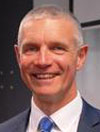 Iain Hay
Iain Hay
The Association of American Geographers is proud to present the Gilbert Grosvenor Honors in Geographic Education to Dr. Iain Hay. Dr. Hay currently serves as the Matthew Flinders Distinguished Professor of Human Geography at Flinders University in South Australia. Dr. Hay’s contributions to geographic education are sustained, diverse, and far-reaching. In educational administration and leadership, his impact is expansive and profound. In Australia, he oversaw the restructuring of departmental programs as Head of School in Flinders’ School of Geography, Population and Environmental Management. He was subsequently seconded for several years to the Australian Teaching and Learning Council—an appointment that a nominator described as based on his “demonstrated capacity for leadership at a senior level; his strong record of scholarly contributions; an international record of strategic change management [and] demonstrated experience managing complex projects involving early career and senior staff.” In that senior and national-level role, he supported the writing of the Australian National Learning and Teaching Academic Standards for the Arts, Social Sciences and Humanities. He also helped to build educational networks, best practices and quality assurance mechanisms for multiple professional and academic groups across a wide range of disciplines.
Dr. Hay’s scholarly production has shaped undergraduate geography education and faculty training around the world. Now in their fourth, third, and third editions, respectively, his Qualitative Research Methods in Human Geography (editor), Making the Grade: A Guide to Successful Communication and Study (co-author) and Communicating in Geography and the Environmental Sciences (author) are widely used in undergraduate instruction. As importantly, Dr. Hay is committed in his contributions to the development of cutting-edge pedagogies and practices among geographers and academicians more broadly. He wrote Research Ethics for Social Scientists (with M. Israel) and edited Inspiring Academics: Learning with the World’s Great University Teachers (2011). His most recent book, How to be an Academic Superhero: Establishing and Sustaining a Successful Career in the Social Sciences, Arts and Humanities is currently in press with Edward Elgar.
Dr. Hay’s contributions to geography pedagogy and practice extend to his active work in international service within the discipline. For example, he has been active in the editorship of the Journal of Geography in Higher Education, has supported the AAG’s EDGE project around issues of ethical research practice, and has been instrumental in building an international research network with U.S. and U.K.-based colleagues for Learning and Teaching Geography.
For the breadth of his multi-scalar contributions to geographic education, and for his sustained commitment to the teaching mission globally, we are proud to present Dr. Iain Hay with the Gilbert Grosvenor Geographic Education Award.
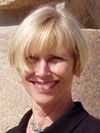 Michal Lee LeVasseur
Michal Lee LeVasseur
Michal LeVasseur is awarded the Association of American Geographers 2018 Gilbert Grosvenor Geographic Education Honors for her foundational work and leadership role in the effort to advance geographic education in the K-12 curriculum of schools throughout the United States. She distinguished herself as a faculty member, author, mentor, consultant and administrator. Holding a variety of positions in the Alabama Geographic Alliance, The National Council for Geographic Education and the National Geographic Society’s education program she effectively participated in all the critical efforts to expand the role of geography education. After teaching at Florida Junior College from 1973 to 1978, Dr. LeVasseur moved to the University of South Florida Tampa where she taught until 1991. After moving to Alabama she returned to graduate school at University of South Florida Tampa to conduct research on the barriers the keep female students from excelling in geography, earning her PhD in 1999.
While working as an adjunct professor at Jacksonville State University and the University of Alabama she carried out foundational work and leadership roles in the Alabama Geographic Alliance. These roles enabled her to work as a writer and educational consultant for a variety of organizations and publishers. Her publications include a wide range of teaching materials, textbook projects, and teacher guides. In 1998 she became a consultant to the National Geographic Society’s Education Program. For the next decade she directed and taught in NGS summer institutes which were attended by hundreds of teachers from across the nation. She also consulted in the development of NGS materials, and helped shape the NGS education programs. At NGS she became a role model for young women who attend her institutes and workshops. Because of her influence and encouragement many of these teachers returned to graduate school to earn advanced degrees and became active in the professional organizations involved in the advancement of geographic education.
From 2002 to 2007 Dr. LeVasseur served as the Executive Director of the National Council for Geographic Education. During which time she provided strong administrative leadership and stablished effective communications and cooperative programs among NCGE, NGS and AAG. In 2008 she rejoined NGS and served as a liaison and mentor to state alliances until 2013. Throughout her career she served as consultant to academic publishers and state education agencies. A staunch member of Gamma Theta Upsilon, she has held a variety of leadership roles in including President and currently serves as Comptroller.
It is with great pleasure that we recognize Michal LeVasseur for her extensive and profound contributions to the advancement of geographic education.
In addition the previous awards, the Honors Committee is charged with making recommendations for two other awards, as follows:
AAG Media Achievement Award
The AAG Media Achievement Award is conferred in recognition of exceptional and outstanding accomplishments in publicizing geographical insights in media of general or mass communication.
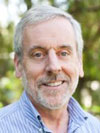 Allen Carroll
Allen Carroll
Allen Carroll is, in the words of one of his nominators, an outstanding “cartographer-artist-historian-photographer-naturalist-author,” with a distinguished career in print and online media. He has worked as Art Director of National Geographic Magazine, Chief Cartographer and Executive Vice-President of National Geographic Maps, and the lead for Esri’s story maps team. Among the highlights of his contributions to Geography, Carroll was the Art Director for the National Geographic Society’s 1988 Historical Atlas of the United States, which was distributed free to 35,000 schools across the country. He also oversaw publication of multiple editions of the National Geographic Atlas of the World. At Esri, Carroll leads the development team for story maps, an open source GIS tool that has been used by community groups, journalists, scholars, and students (among others) to tell their stories elegantly and accessibly via interactive online maps. To date, more than 250,000 story maps have been created. Story maps have had a particularly strong pedagogical impact, allowing instructors to flip the classroom and let students develop scholarly and creative projects and tools for public outreach. Simply put, Carroll’s career of promoting public access to geographical results, concepts, and tools is unparalleled. As one of his nominators wrote, “What Allen has done so well over the years is to let the maps be the beckoners to the wonderful world of geography.”
AAG Publication Award
The AAG Publication Award is conferred in recognition of exceptional and outstanding contributions to the discipline by publishers.
 Wiley
Wiley
The 2017 AAG Publication Award is awarded to Wiley Publishers for their support in creating and publishing the landmark 15-volume International Encyclopedia of Geography: People, the Earth, and Technology. Wiley also maintains and updates an online version of this publication to ensure the most current information in each subarea of the discipline. This project is the most comprehensive and authoritative resource available for the Geography as a whole.
This set of volumes engaged geographer GIScientists, and geographic societies from around the globe. These volumes reflect the interdisciplinary and international nature of geography’s scholarly and research activities. The scope and range of this publication enables a much fuller discussion of the multiple sub-disciplines and perspectives of modern geography that is typically the case.
Wiley has provided a valuable reference and research resource for professional geographers as well as educators and students at all levels. The Encyclopedia provides an enormous body of new content and analysis for research and teaching geography in many science, social science/studies, and humanities fields in schools and universities. Governmental ministries, planning agencies, private-sector firms, and society will find it to be an indispensable resource, especially with the advent of new geographic technologies and geospatial information.
In addition, Wiley Publishers continuously support geography and the AAG by sponsoring many special events at the annual meeting. Editors and staff at Wiley provide support and encouragement to their authors. The publisher, production editors, copyeditors, proofreaders, and marketing staff contribute patience and advice to all of their authors, especially in relation to the Encyclopedia. Wiley and the Encyclopedia will have a great impact on the advancement of geographic scholarship and education across the full range of the discipline and around the world for decades to come.
The AAG is pleased to recognize and honor Wiley Publishers for their commitment to publishing, in print and online, the International Encyclopedia of Geography: People, the Earth, and Technology, as well as their pledge to update annually the online resource of this same publication, with the 2017 AAG Publication Award.
The above awards are determined by a rotating Honors Committee. The 2017-2018 Honors Committee Members are Robin Leichenko (chair) (Rutgers University), David A. Lanegran (Macalester College), Wei Li (Arizona State University), Kendra McSweeney (Ohio State University), Laura Pulido (University of Oregon), and Nathan Sayre (University of California Berkeley). Observer members this year who will rotate in as members next year are Lisa DeChano-Cook (Western Michigan University), Wendy Jepson (Texas A&M University), and Rebecca Lave (Indiana University).
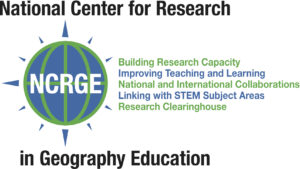 The National Center for Research in Geography Education (NCRGE) is pleased to announce keynotes by Nora Newcombe and David Lambert for a special track of geography education sessions during the 2018 AAG Annual Meeting in New Orleans.
The National Center for Research in Geography Education (NCRGE) is pleased to announce keynotes by Nora Newcombe and David Lambert for a special track of geography education sessions during the 2018 AAG Annual Meeting in New Orleans.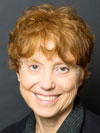 Nora S. Newcombe is Laura H. Carnell Professor of Psychology at Temple University. She received her B.A. in 1972 from Antioch College and her Ph.D. in 1976 from Harvard University. Her research focuses on spatial cognition and development, and the development of episodic memory. She is currently Principal Investigator of the NSF-funded Spatial Intelligence and Learning Center (SILC) whose purpose is to develop the science of spatial learning and to use this knowledge to support children and adults in acquiring scientific, technical, engineering, and mathematical (STEM) skills. Dr. Newcombe is the author of numerous publications including Making Space with Janellen Huttenlocher (MIT Press, 2000). She has received numerous awards, including the Distinguished Scientific Contributions Award from SRCD (2015), the William James Award from APS (2014), the George A. Miller Award for an Outstanding Recent Article in General Psychology (twice, 2004 and 2014) and the G. Stanley Hall Award for Distinguished Contribution to Developmental Psychology (2007). She was elected to the American Academy of Arts and Sciences (2006) and to the Society of Experimental Psychologists (2008). She has served as Editor of the Journal of Experimental Psychology: General and Associate Editor of Psychological Bulletin, has been a Visiting Professor at the University of Pennsylvania, Princeton, and the Wissenschaftskolleg in Berlin. She is currently the Past Chair of the Governing Board of the Cognitive Science Society, Chair of Section J (Psychology) of the American Association for the Advancement of Science, and President-Elect of the Federation of Associations of Behavioral and Brain Sciences.
Nora S. Newcombe is Laura H. Carnell Professor of Psychology at Temple University. She received her B.A. in 1972 from Antioch College and her Ph.D. in 1976 from Harvard University. Her research focuses on spatial cognition and development, and the development of episodic memory. She is currently Principal Investigator of the NSF-funded Spatial Intelligence and Learning Center (SILC) whose purpose is to develop the science of spatial learning and to use this knowledge to support children and adults in acquiring scientific, technical, engineering, and mathematical (STEM) skills. Dr. Newcombe is the author of numerous publications including Making Space with Janellen Huttenlocher (MIT Press, 2000). She has received numerous awards, including the Distinguished Scientific Contributions Award from SRCD (2015), the William James Award from APS (2014), the George A. Miller Award for an Outstanding Recent Article in General Psychology (twice, 2004 and 2014) and the G. Stanley Hall Award for Distinguished Contribution to Developmental Psychology (2007). She was elected to the American Academy of Arts and Sciences (2006) and to the Society of Experimental Psychologists (2008). She has served as Editor of the Journal of Experimental Psychology: General and Associate Editor of Psychological Bulletin, has been a Visiting Professor at the University of Pennsylvania, Princeton, and the Wissenschaftskolleg in Berlin. She is currently the Past Chair of the Governing Board of the Cognitive Science Society, Chair of Section J (Psychology) of the American Association for the Advancement of Science, and President-Elect of the Federation of Associations of Behavioral and Brain Sciences.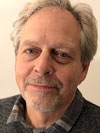 David Lambert is Professor of Geography Education at University College London Institute of Education (UCL – IOE). Obtaining his BA from the University of Newcastle in 1973 he went on to his post graduate professional training at the University of Cambridge. He was a secondary school teacher for twelve years, becoming a deputy principal of a comprehensive school. He became a university teacher-educator from 1986, developing research interests in curriculum, pedagogy and assessment in geography education. His school textbook series Jigsaw Pieces published by Cambridge University Press won the TES school book of the year award in 1991. Receiving his doctorate in 1995 from the University of London, he rose to become Assistant Dean for teacher education in 1999. He left temporarily the academy in 2002 when he was appointed full-time chief executive of the Geographical Association (GA) (www.geography.org.uk). He returned to the IOE as professor in 2007 and was awarded the Royal Geographical Society Taylor Francis Award for leadership in geography education in 2015. Recent books include Knowledge and the Future School (2014), Learning to Teach Geography (3rd Edition, 2015), and Debates in Geography Education (2nd Edition, 2017). He chairs the Editorial Collective of Geography and serves as Associate Editor of International Research in Geographical and Environmental Education. He led the European Union funded GeoCapabilities project from 2013-17 (www.geocapabilities.org).
David Lambert is Professor of Geography Education at University College London Institute of Education (UCL – IOE). Obtaining his BA from the University of Newcastle in 1973 he went on to his post graduate professional training at the University of Cambridge. He was a secondary school teacher for twelve years, becoming a deputy principal of a comprehensive school. He became a university teacher-educator from 1986, developing research interests in curriculum, pedagogy and assessment in geography education. His school textbook series Jigsaw Pieces published by Cambridge University Press won the TES school book of the year award in 1991. Receiving his doctorate in 1995 from the University of London, he rose to become Assistant Dean for teacher education in 1999. He left temporarily the academy in 2002 when he was appointed full-time chief executive of the Geographical Association (GA) (www.geography.org.uk). He returned to the IOE as professor in 2007 and was awarded the Royal Geographical Society Taylor Francis Award for leadership in geography education in 2015. Recent books include Knowledge and the Future School (2014), Learning to Teach Geography (3rd Edition, 2015), and Debates in Geography Education (2nd Edition, 2017). He chairs the Editorial Collective of Geography and serves as Associate Editor of International Research in Geographical and Environmental Education. He led the European Union funded GeoCapabilities project from 2013-17 (www.geocapabilities.org). Laura Akindo recently graduated from Frostburg State University with a Bachelor’s of Science degree in Earth Science with a Concentration in Environmental Science. She also majored in Geography. Laura is in the process of applying to Graduate Programs and hopes to begin working on her Masters of Science in the Fall in GIS and Environmental Management and Policy. In her spare time, Laura likes to read, visit new exciting outdoor parks, and watch soccer.
Laura Akindo recently graduated from Frostburg State University with a Bachelor’s of Science degree in Earth Science with a Concentration in Environmental Science. She also majored in Geography. Laura is in the process of applying to Graduate Programs and hopes to begin working on her Masters of Science in the Fall in GIS and Environmental Management and Policy. In her spare time, Laura likes to read, visit new exciting outdoor parks, and watch soccer.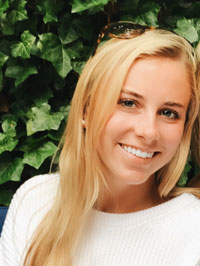
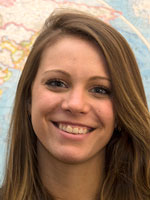 Katelyn Suranovic is currently pursuing her master’s degree in geography at George Washington University. Her focus is climate change and weather-related phenomena in response to climatic changes. Previously, Katelyn earned her bachelor of science degree from James Madison University (JMU), where she majored in geographic science with a concentration in environmental conservation, sustainability and development.
Katelyn Suranovic is currently pursuing her master’s degree in geography at George Washington University. Her focus is climate change and weather-related phenomena in response to climatic changes. Previously, Katelyn earned her bachelor of science degree from James Madison University (JMU), where she majored in geographic science with a concentration in environmental conservation, sustainability and development.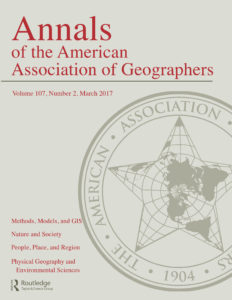
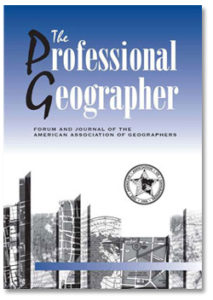 The AAG began publishing
The AAG began publishing 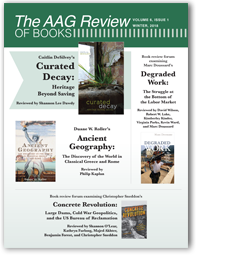

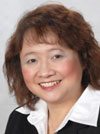 Mei-Po Kwan, University of Illinois Urbana-Champaign
Mei-Po Kwan, University of Illinois Urbana-Champaign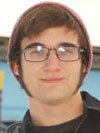
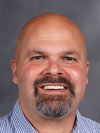 David Kaplan, Kent State University
David Kaplan, Kent State University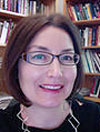 Banu Gökarıksel, University of North Carolina Chapel Hill
Banu Gökarıksel, University of North Carolina Chapel Hill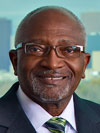
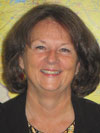 Susan Cutter, University of South Carolina
Susan Cutter, University of South Carolina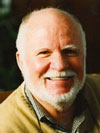 Billie L. Turner, II, Arizona State University
Billie L. Turner, II, Arizona State University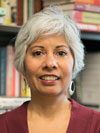 Laura Pulido, University of Oregon
Laura Pulido, University of Oregon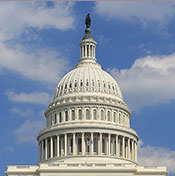 A massive tax reform package signed into law by President Trump shortly before the holidays drew attention primarily for slashing corporate rates and amending individual filing rules. The legislation, however, was also of significance for the higher education community.
A massive tax reform package signed into law by President Trump shortly before the holidays drew attention primarily for slashing corporate rates and amending individual filing rules. The legislation, however, was also of significance for the higher education community.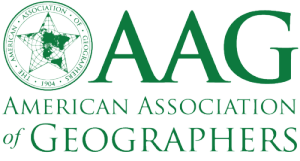 Volunteering for the AAG is a great way to become engaged in a national association in your field while boosting your professional credentials. Providing your service to the AAG enhances the discipline of geography, helping make connections among people and building a stronger geography community. It also expands your own network of colleagues and friends!
Volunteering for the AAG is a great way to become engaged in a national association in your field while boosting your professional credentials. Providing your service to the AAG enhances the discipline of geography, helping make connections among people and building a stronger geography community. It also expands your own network of colleagues and friends! Positions are available on elected committees as well as standing and ad hoc committees. Members can run for election to the
Positions are available on elected committees as well as standing and ad hoc committees. Members can run for election to the 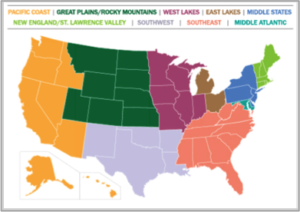 The AAG has 9 Regional Divisions; do you know which one you are located in? Serve your AAG Regional Division as an officer, help organize the regional division annual meetings (held annually in the fall), run for election as a Regional Councilor to coordinate between the AAG headquarters and the regional division, or help to organize a regional geography bowl or paper competition, for students to get funding assistance to attend the AAG Annual Meeting! Contact your
The AAG has 9 Regional Divisions; do you know which one you are located in? Serve your AAG Regional Division as an officer, help organize the regional division annual meetings (held annually in the fall), run for election as a Regional Councilor to coordinate between the AAG headquarters and the regional division, or help to organize a regional geography bowl or paper competition, for students to get funding assistance to attend the AAG Annual Meeting! Contact your 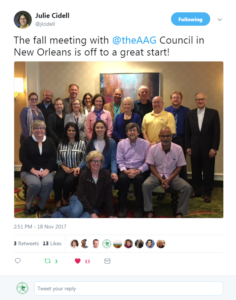 The AAG Council serves as the governing body for the Association and consists of elected councilors (six national Councilors, one Councilor from each of our nine Regional Divisions, and a Student Councilor), the AAG Vice President, President and Past President, the AAG Treasurer, AAG Secretary and the Executive Director of the AAG. Consider running for election for Vice President, as a
The AAG Council serves as the governing body for the Association and consists of elected councilors (six national Councilors, one Councilor from each of our nine Regional Divisions, and a Student Councilor), the AAG Vice President, President and Past President, the AAG Treasurer, AAG Secretary and the Executive Director of the AAG. Consider running for election for Vice President, as a  Tom Baerwald, National Science Foundation
Tom Baerwald, National Science Foundation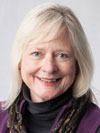 Sarah Bednarz, Texas A&M University
Sarah Bednarz, Texas A&M University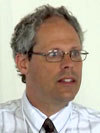 Daniel Block, Chicago State University
Daniel Block, Chicago State University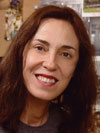 Judith Carney, UCLA
Judith Carney, UCLA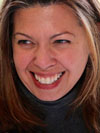 Jennifer Clark, Georgia Institute of Technology
Jennifer Clark, Georgia Institute of Technology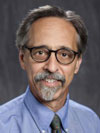 Craig Colten, Louisiana State University
Craig Colten, Louisiana State University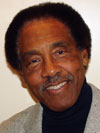 Joe Darden, Michigan State University
Joe Darden, Michigan State University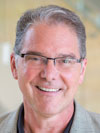 David DiBiase, ESRI
David DiBiase, ESRI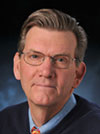 Kenneth Foote, University of Connecticut
Kenneth Foote, University of Connecticut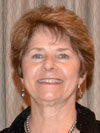
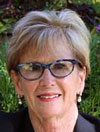 Patricia Gober, Arizona State University
Patricia Gober, Arizona State University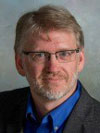 Stephen Hanna, University of Mary Washington
Stephen Hanna, University of Mary Washington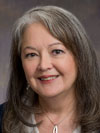 Audrey Kobayashi, Queen’s University
Audrey Kobayashi, Queen’s University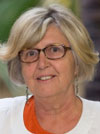 Helga Leitner, UCLA
Helga Leitner, UCLA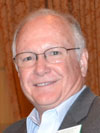
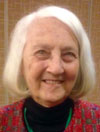 Janice Monk, University of Arizona
Janice Monk, University of Arizona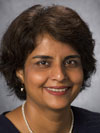 Kavita Pandit, Georgia State University
Kavita Pandit, Georgia State University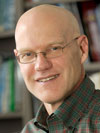
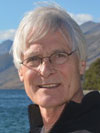 Douglas Sherman, University of Alabama
Douglas Sherman, University of Alabama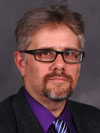 James Tyner, Kent State University
James Tyner, Kent State University William Clark
William Clark  Richard Peet
Richard Peet Katherine Gibson
Katherine Gibson Henry Yeung
Henry Yeung Iain Hay
Iain Hay Michal Lee LeVasseur
Michal Lee LeVasseur Allen Carroll
Allen Carroll Wiley
Wiley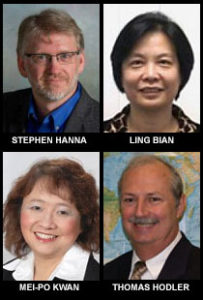 The AAG welcomes two new editors to take the positions of Cartography Editor for the AAG Journals (Annals, The Professional Geographer, and GeoHumanities) and the Methods, Models, and GIS Editor for the Annals of the AAG starting January 1, 2018. Stephen Hanna will be taking over for Cartography Editor Thomas Hodler while Ling Bian will assume the role of the Methods, Models and GIS Editor as Mei-Po Kwan steps down. The AAG would like to send a very special thank you to Thomas Hodler and Mei-Po Kwan for their years of extraordinary service in these positions.
The AAG welcomes two new editors to take the positions of Cartography Editor for the AAG Journals (Annals, The Professional Geographer, and GeoHumanities) and the Methods, Models, and GIS Editor for the Annals of the AAG starting January 1, 2018. Stephen Hanna will be taking over for Cartography Editor Thomas Hodler while Ling Bian will assume the role of the Methods, Models and GIS Editor as Mei-Po Kwan steps down. The AAG would like to send a very special thank you to Thomas Hodler and Mei-Po Kwan for their years of extraordinary service in these positions.